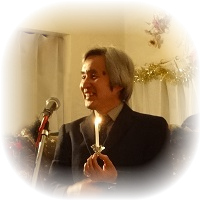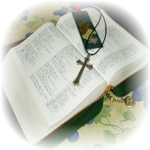↓Audio link to the sermon:(1st worship recording)
(If you can’t listen on your iPhone, please update your iOS)
Today we will be reading from the book of Zephaniah. In the past, I have mentioned several
times about King Josiah, who carried out religious reforms in Judah. Judah, the southern
kingdom of Israel, had many problems. In particular, the rulers before Josiah, King Manasseh
and Amon, were considered evil kings as they allowed idolatry to be practiced even in
Jerusalem, and they ruled in a way that was against God’s laws. It was in this context that
King Josiah tried to reform the country, and one of the prophets who encouraged him was
Zephaniah. As we read from Zephaniah today, in my message I would like to think about
what kind of words the prophet said that encouraged King Josiah.
The book of Zephaniah is made of 3 main sections. First, God’s judgment on Jerusalem.
Second, judgment on other nations. Third, a promise of salvation at the end of time. I will
read verses from various passages that stood out to me.
Chapter 1, verse 1: “The word of the Lord that came to Zephaniah son of Cushi, the son of
Gedaliah, the son of Amariah, the son of Hezekiah, during the reign of Josiah son of Amon
king of Judah.” This verse that tells us Zephaniah served during the time of King Josiah.
Furthermore, it says Zephaniah was a descendant of King Hezekiah. Hezekiah was known as
a good king, and being his descendant it is likely that the words of Zephaniah in this book
were heard by King Josiah.
The first part of Zephaniah’s prophecy was about God’s judgment against Jerusalem. In
Josiah’s time, as a result of King Manasseh’s reign, the people’s hearts had become more
degenerate, they forgot God’s laws, and they were consumed with idol worship. In its own
way, Japan is going through a very difficult time. There is chaos in our political scene, and
we have just suffered a major earthquake. We began the year this way, but I hope it will
challenge us to trust again in the God of the Bible.
Moving on, chapter 1 verse 4 says, “I will stretch out my hand against Judah and against all
who live in Jerusalem. I will destroy every remnant of Baal worship in this place, the very
names of the idolatrous priests—” Verse 5 and 6: “those who bow down on the roofs to
worship the starry host, those who bow down and swear by the Lord and who also swear by
Molech, those who turn back from following the Lord and neither seek the Lord nor inquire
of him.” The name “Molech” tells us that the worship of heavenly bodies that flourished in
ancient Mesopotamia was practiced in Jerusalem—along with worshipping idols of the
Ammonite people.
Next, verse 7 says, “Be silent before the Sovereign Lord, for the day of the Lord is near.” The
“day of the Lord” is an expression that means the time of God’s judgment. Verses 14 and 15
describe it like this: “The great day of the Lord is near—near and coming quickly. The cry on
the day of the Lord is bitter; the Mighty Warrior shouts his battle cry. That day will be a day
of wrath—a day of distress and anguish, a day of trouble and ruin, a day of darkness and
gloom, a day of clouds and blackness.” So, God’s great judgment is approaching Jerusalem—
this is the first part of Zephaniah’s message.
Turning to the next chapter, chapter 2 verse 3 says, “Seek the Lord, all you humble of the
land, you who do what he commands. Seek righteousness, seek humility; perhaps you will be
sheltered on the day of the Lord’s anger.” Zephaniah says: before the day of God’s wrath
comes, seek humility, seek to inquire of the Lord, seek righteousness, seek meekness, seek
the Lord’s help. I believe this is another of Zephaniah’s words that moved the heart of King
Josiah: to seek repentance before the day of great judgment comes.
But God’s judgment was not only directed at the land of Israel. It was also for the
surrounding nations. And this is the second part of Zephaniah’s message, which we see from
chapter 2 verse 4 onwards.
Verse 4 mentions Gaza, which was a Philistine city by the Mediterranean Sea. Verse 8
mentions Moab, a nation to the east of Israel, while verse 12 mentions Cushites, referring to
people from around Ethiopia to the south. Verse 13 prophesies judgment on Assyria, which is
far to the north. Once again, God’s judgment was not only on Israel but extended to the
nations around it, especially Assyria. In this second part of Zephaniah’s message, he
prophesies about the larger world beyond Israel.
Moving into chapter 3 now, the prophet is now addressing Jerusalem again. In chapter 3
verses 1 and 2, he says, “Woe to the city of oppressors, rebellious and defiled! She obeys no
one, she accepts no correction. She does not trust in the Lord, she does not draw near to her
God.” Verse 4: “Her prophets are unprincipled; they are treacherous people. Her priests
profane the sanctuary and do violence to the law.” These verses describe again the condition
of the people of Israel.
However, from chapter 3 verse 9, the prophet’s message takes a big turn. Zephaniah speaks of
a remnant of people that God will allow to remain—a humble and meek people—and that
Israel will be blessed through them. This remnant is a blessing of great hope. In one sense, we
as Christians are meant to be a remnant like this, people who continue to shine a light in the
midst of a chaotic and confused society. Let us take more time to read about this hope that
Zephaniah promised. I believe this promise greatly encouraged King Josiah.
Verse 11 says, “On that day you, Jerusalem, will not be put to shame for all the wrongs you
have done to me, because I will remove from you your arrogant boasters. Never again will
you be haughty on my holy hill.” The remnant will have a humility like that of Christ. Verse
12 says, “But I will leave within you the meek and humble. The remnant of Israel will trust in
the name of the Lord.” The meek and humble may sound like a picture of weakness, but
rather it is the image of a believer who humbly trusts in the Lord. Verse 13 says, “They will
do no wrong; they will tell no lies. A deceitful tongue will not be found in their mouths. They
will eat and lie down and no one will make them afraid.” The remnant will live under a good
shepherd, not the influence of deceitful people. (Also see Psalm 23.)
By the way, this blessing prophesied by Zephaniah in chapter 3 was not only for the people of
Israel in that time. It can also be understood as a prophecy of the end times. As believers,
when we meet Jesus Christ in person one day, we will have perfect joy and peace. Verse 14
says, “Sing, Daughter Zion; shout aloud, Israel! Be glad and rejoice with all your heart,
Daughter Jerusalem!” And verse 15: “The Lord has taken away your punishment, he has
turned back your enemy. The Lord, the King of Israel, is with you; never again will you fear
any harm.” The Lord is in the midst of us; we do not ever need to fear disaster again. I
believe King Josiah firmly held onto these promises. In verse 16, Zephaniah says, “Do not
fear, Zion; do not let your hands hang limp.” I believe Josiah was urged to trust in God, to not
lose heart, and to carry out religious reforms in his country. Verse 17 says, “The Lord your
God is with you, the Mighty Warrior who saves. He will take great delight in you; in his love
he will no longer rebuke you, but will rejoice over you with singing.” Zephaniah’s words
urged the king to stand before God with faith and courage to lead the people. These words are
also given to us who live in the end times.
Verse 18 says, “I will remove from you all who mourn over the loss of your appointed
festivals.” Three of the regular Jewish festivals were the Passover, the Festival of the Harvest,
and the Festival of Booths. But the people had neglected to observe these festivals and so had
forgotten the joy of the Lord. It was through festivals like these that the people learned to
trust in God. Verse 19 goes on to say, “At that time I will deal with all who oppressed you. I
will rescue the lame; I will gather the exiles. I will give them praise and honor in every land
where they have suffered shame.” Even if we have been far from God for some time, or have
suffered great trials or persecution, God can turn our shame into honor again. God promised
to bring his people back, to gather them together again.
Through faith, the meek and humble will be restored. This is the message of Zephaniah. We
have read several passages that I believe moved the heart of King Josiah. It is hard to say
which of these impacted him the most. The Lord is in your midst. Be still before the Lord.
The great day of the Lord is coming. I think all of these words reached the king’s heart.
Which of these is most meaningful to you? Japan began the year 2024 with a major disaster.
But in all times and places, God preserves a remnant of people who are meek and humble.
Let us have both humility and boldness as we live out this new year.
(If you can’t hear from the bar above, click the blue button)
iPhone





 日本語
日本語